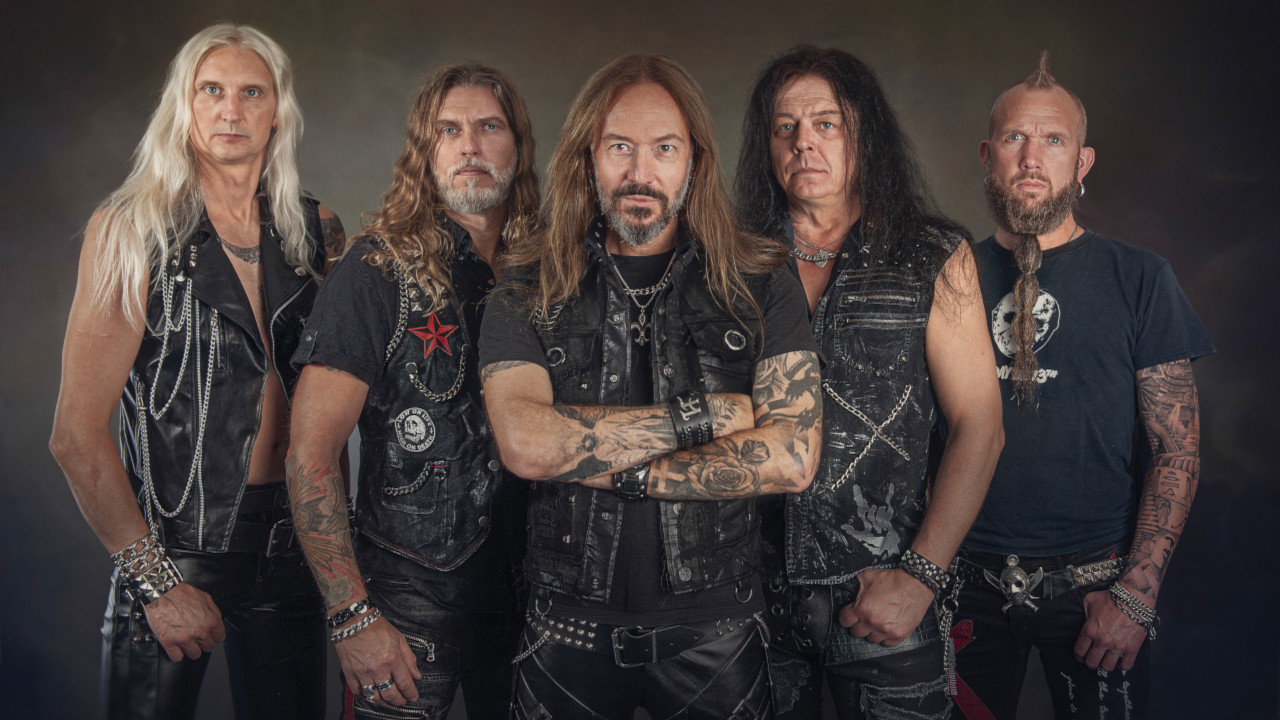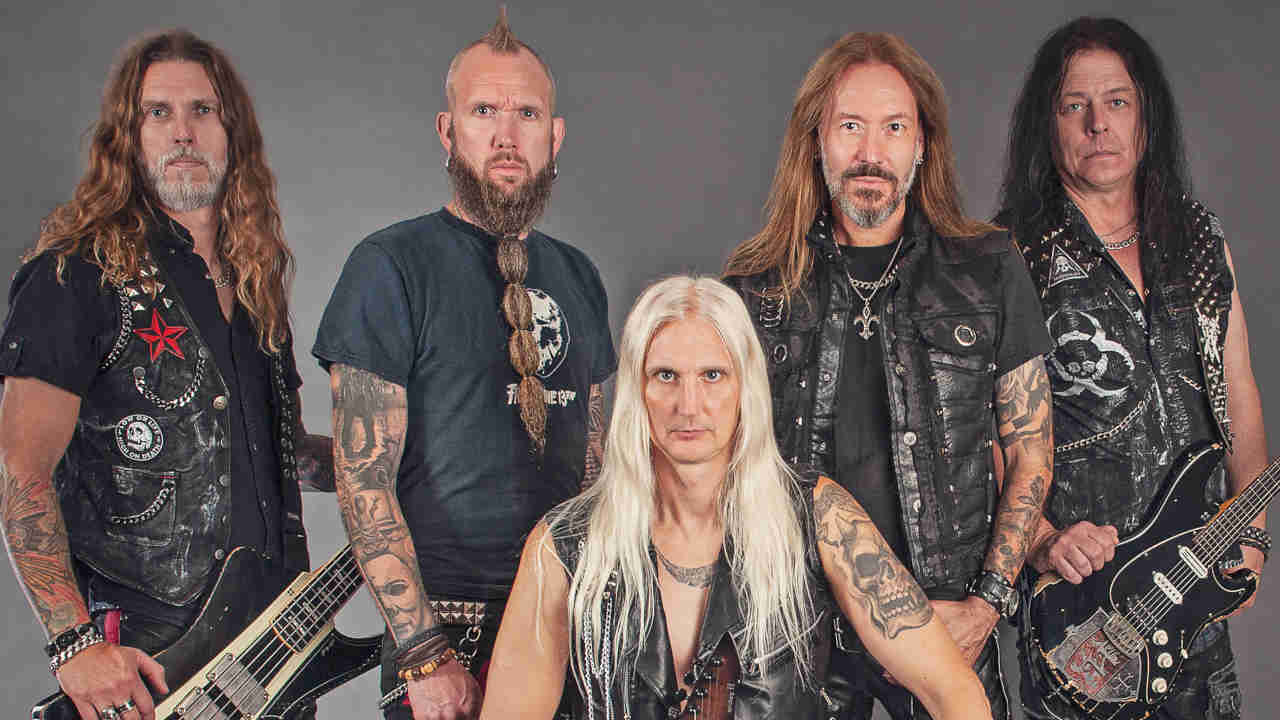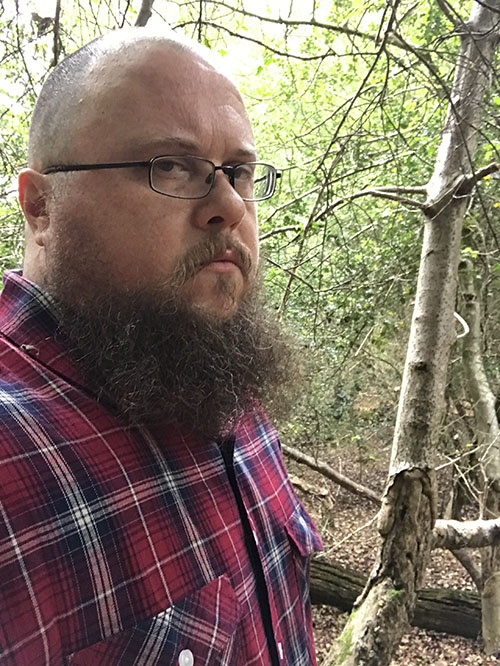In 1993, Sweden’s second city, Gothenburg, was fast becoming the hub of a vital new movement. Swedish death metal had been a phenomenon for six years, but local pioneers At The Gates, In Flames and Dark Tranquillity were refining the elements into something far more melodic and sophisticated, creating a ‘Gothenburg sound’ that was soon to become legendary.
Guitarist Oscar Dronjak began the year embedded in this scene, fronting Ceremonial Oath alongside In Flames multi-instrumentalist Jesper Strömblad. Oscar could have comfortably surfed this wave as his hometown became internationally renowned for quality melodeath, but he was getting restless (and wild); by April ’93, what he calls “musical and clothing differences” led to him being effectively fired from his own band.
“I felt my world had blown up,” confesses Oscar, but he didn’t stay glum for
long. He’d begun writing an ’80s-influenced headbanger, Steel Meets Steel, for Ceremonial Oath; by the time it was finished, it was the first song for Hammerfall.
This new band only existed in Oscar’s head, but it was to become the enduring vehicle for his true musical passion. “Hammerfall was born as a heavy metal band that wore the leather, studs and chains that Ceremonial Oath did not want me to wear!” Oscar laughs.
Recruiting musicians wasn’t a problem. “I don’t think I knew anybody who didn’t play in a band,” he remarks, “but it was harder to find people who were likeminded.”
With Jesper on drums and Dark Tranquillity’s Mikael Stanne singing, Hammerfall started playing shows, but when Mikael became too busy with his main band to play Gothenburg’s 1996 Rockslaget music contest, Oscar was faced with a monumental task: where to find an old-school metal singer who could convincingly perform lyrics about slaying dragons while hitting crystal-clear high notes?
Especially at a time when alt rock and nu metal snarls dominated the mainstream, and the underground was all death growls and black rasps. “There were not a lot of people around who liked this kind of music, let alone could sing it,” admits Oscar.

Cometh the hour, cometh the frontman. Enter Joacim Cans, who’d distinguished himself hitting epic high notes for local 80s throwbacks Highlander. “We invented our own genre called ‘sword metal’,” Joacim grins. “We wore chainmail and tournament dress; we totally went for it. But I’d given up my whole musical career by then, I was working in a record store. I never thought about getting back in a band.”
With time running out as the make-or-break show loomed, Joacim took the tram from Gothenburg to nearby suburb Billdal for his first Hammerfall rehearsal, walking straight into a life-changing metal bonding experience.
“I opened the door and heard someone playing a guitar melody. I was like, ‘Hmm’! So I went downstairs and the first person I saw was Oscar playing his guitar. I walked in, pointed at him and said, ‘Dorian Gray, Stormwitch!’”
As soon as Joacim correctly identified this obscure instrumental from a then-defunct 80s German metal band, Oscar knew he’d found his man. “My jaw was on the floor!” the guitarist enthuses. “I didn’t have any friends who even knew about Stormwitch, let alone liked them!”
“All the other bands were talking about grunge and thrash and all that,” adds Joacim, “but we kept on about all these obscure bands like Stormwitch and Warlord and Picture. I think that was a good start, it showed us the manual for heavy metal that we use is the same!”
Hammerfall had found their missing piece, the perfect voice for their rousing, chivalric 80s-style heavy metal – although they didn’t win that Rockslaget. “Usually if you win, you never become successful,” observes Joacim. “You should always be runner-up!”
Victory was pretty unlikely; in the painfully fashion-conscious mid 90s, grunge threads and baggy sportswear ruled the floor, and if you saw a Judas Priest shirt in a rock club it was probably ‘ironic’.
In this environment Hammerfall were marching onstage in top-to-toe studded leather, playing songs like The Dragon Lies Bleeding. Did that require balls of steel? “Hang on, let me check…” Oscar peers downwards. “It doesn’t look like it! No, it was just, ‘This is what we want to do, and fuck everyone else if they don’t understand it.’”

Twenty-five years since their Glory To The Brave debut almost single-handedly triggered a power metal revolution, the secret to Hammerfall’s longevity remains the bond between Oscar and Joacim, proudly proclaimed on Brotherhood, the opening track on new album Hammer Of Dawn.
Together they have overseen this unlikely journey from defiantly outmoded, low-priority side-project to much-loved Swedish metal institution, and their connection remains powerfully evident, the mutual respect and shared humour shining through even remotely on a cold, grey Thursday morning Zoom call.
“I still have the very first letter that Oscar sent me,” beams Joacim. Oscar laughs at Joacim’s playfully ‘bromantic’ choice of words, as this introductory missive was just “some instructions for a couple of songs”.
Nevertheless, that 1996 epistle – as old now as the singer was when he received it – represents the first contact between Hammerfall’s stalwart bandleaders, from a time when world tours and chart-topping albums were an impossible dream.
“If you started playing this music when we did, you were delusional if you thought it was going to lead anywhere,” says Joacim. “When our debut came out, we thought if we sold 4,000 copies that’d be amazing. Getting to record a heavy metal album and release it on vinyl, that was all I wanted out of this, that was the best thing I could imagine.”
It didn’t take long for Hammerfall’s humble ambitions to require dramatic upscaling. Breakthrough LP Renegade, released in 2000, turned them into Swedish metal superstars – but their heightened profile attracted hate as well as love. In 2002, Joacim was glassed in the face at a local rock club by a black metal yob, a horrendous attack that still affects him.
“Getting up onstage afterwards was no problem, getting to the stage was more the problem,” he reveals. “Walking the streets, if [I met] guys with long hair, I saw them as the enemy all of a sudden. And that’s still there, that hesitation about going into crowded rooms. It didn’t affect my career at all, I was just a little more insecure, but somehow I came out stronger. We just continued as planned and dealt with it. Isn’t that like taking a happy pill, being onstage, doing what we do?”
Oscar also suffered a frightening physical trauma, spookily exactly one year later. Cruising on his Harley-Davidson at 70kmh in shorts and tank top, he collided with
a parked car, and was lucky to escape with a broken arm. “My first thought was, I hope nothing happens with the show tomorrow,” he confesses.
These setbacks only seemed to strengthen the bond and redouble the resolve, but some things had to change. Managing themselves until the task became too vast, Hammerfall went through a string of agents who weren’t sufficiently committed to the purity of the band’s vision, whose attempts to change the winning formula received short shrift.
Joacim nails it: “Never change what you do, change how you do it.”
Oscar lights up: “Best quote ever!”
An example of this dictum in action came after 2011’s Infected tour, entering their 15th year of relentless schedules and saddled with management issues, with Joacim approaching burnout. “When the afterparty is more important than the actual show, something is wrong,” he explains.
“What we did was to take a little break and think, ‘Where do we want to take Hammerfall?’ Coming back after that hiatus, starting to write songs again, I don’t think I’d experienced anything that fun in my whole life. From that day on, I wouldn’t wish to be any place else in my career or with any other band.”
Oscar concurs: “It was the best thing we ever did, to take that break. It was good for everybody to take a step back.”
Hammerfall soon returned to a consistent schedule that suited them, but they’ve lately been forced to take another step back, along with the rest of the world. Both men acutely feel the absence of live shows, but are grateful they managed to complete a US tour with Sabaton before lockdown – a welcome opportunity to impress a younger crowd. “It was fantastic to do this tour to show the damn Yankees what’s going on in Sweden!” Joacim enthuses.
“Heavy metal is a big export here, and it’s amazing what Sabaton have done; it’s a whole new generation they reached out to. In another 10 years the old-timers won’t be around, it was time to pass the torch years ago, and Sabaton are one of those bands.”
“That was a huge deal for us,” Oscar notes of the tour. “We had lots of new fans come up to us, so happy to find a band they like. The enthusiasm of people who just found out about us is very contagious!”
The enforced hiatus has only sharpened their hunger, Oscar visibly straining to get back onstage. Joacim is more sanguine, seizing onto the brotherhood theme as our conversation winds to a close.
“The band has grown closer together than ever before,” the frontman avows. “We’re all working towards the same goal, we’re all respectful of each other. The focus in mind is what’s best for the band – and it hasn’t always been that way. That’s part of why the brotherhood is so strong right now with Hammerfall.”
Hammer Of Dawn is out now via Napalm


